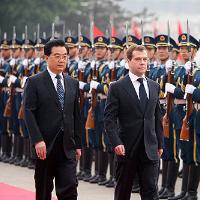Perhaps the most surprising feature of the protracted crisis in Kyrgyzstan is what has not happened: Neither of Eurasia's two preeminent regional security institutions, the Collective Security Treaty Organization (CSTO) and the Shanghai Cooperation Organization (SCO), have coordinated a military intervention in that country.
The mass protests, deaths, and refugee crisis involving perhaps 1 million people has represented one of the most acute challenges to Eurasian stability in the history of either organization, both of which were founded almost a decade ago. In mid-June 2010, the Kyrgyz interim authorities even directly appealed for Russian military intervention on their behalf, but Moscow declined to act military -- either unilaterally or within the framework of either the CSTO or the SCO. Both organizations have offered primarily verbal support and limited humanitarian assistance to their beleaguered member state. Despite expectations, neither organization has yet become a modern version of the Warsaw Pact, using military and police power to keep its client regimes in power.
After the collapse of the Soviet Union, the Commonwealth of Independent States (CIS) originally represented the most important institution among the former Soviet republics, except for the Baltic republics, which broke completely with Moscow. Over time, the CIS steadily lost influence, due primarily to the diverging agendas pursued by its 12 member governments. A frustrated Russian government under former President Vladimir Putin decided instead to orchestrate the formation of the CSTO in 2002. Its members included only the most pro-Moscow former Soviet republics, including Armenia, Belarus, and all the Central Asian countries except Turkmenistan.

